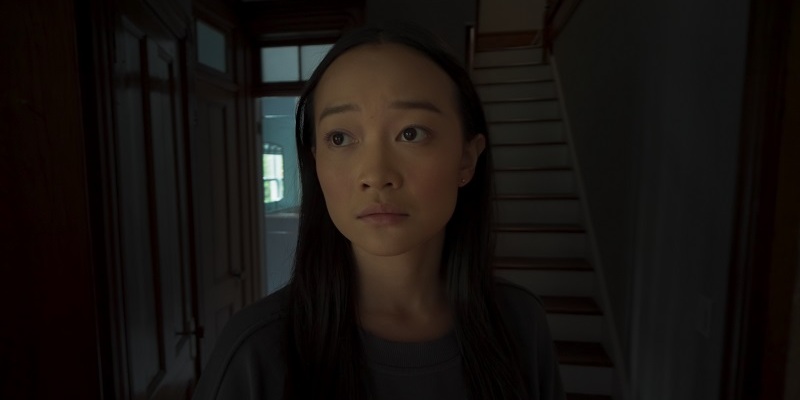
Review by
Eric Hillis
Directed by: Steven Soderbergh
Starring: Lucy Liu, Julia Fox, Chris Sullivan, Callina Liang, Eddy Maday, West
Mulholland

The premise of director Steven Soderbergh and writer David Koepp's
Presence might seem unremarkable: a family moves into a new home and
begins to feel an otherworldly presence. What makes Presence stand out
from the scores of horror movies with which it shares its surface setup
is how the story is presented. Every event in Presence is seen from the
point of view of the
ghost/spirit/spectre/poltergeist/whatever-you-want-call-it.
The opening scene establishes what we're in for as we're taken on a whirlwind tour of the at this point unoccupied home, the camera gliding
through rooms and peering out windows, the spectre seemingly unable to leave the house. After another scene in which a
crew of painters bicker when one of them refuses to enter the room
currently occupied by the spirit, we meet the house's new occupants, a
family of four. The family in question is deeply divided. Parents Chris
(Chris Sullivan) and Rebecca (Lucy Liu) are clearly going through a
difficult time in their marriage, constantly engaging in
passive-aggressive arguments. Their teenage children appear to have
taken sides, with jockish son Tyler (Eddy Maday) allying with his doting
mother, who makes it clear he's her favourite, while sensitive daughter
Chloe (Callina Liang) favours her father.

Having recently lost her best friend Nadia to a drug overdose, the
second girl in her school to die in such a manner in recent months, Chloe
has become withdrawn. Fearing his daughter may become a third victim,
Chris tries to convince his wife that Chloe is in danger, but both
Rebecca and Tyler have a cruel coldness towards Chloe's grief. As though
drawn to her sadness, the ghost latches onto Chloe, spending most of its
time hanging out in her bedroom, and even tidying up after her. Chloe
becomes all too aware of the presence in the house, which she begins to
think might be the ghost of Nadia, but keeps it to herself until the
entire family witnesses an incident that can't be explained away.
Following the haunted house movie manual, they set aside their agnostic reason
and call in the help of Lisa (Natalie Woolams-Torres), a woman who
claims to be able to communicate with the dead.
Aside from its POV, where Presence deviates from traditional haunted
house thrillers is in establishing early on that the spirit is in no way
malevolent and has no ill intentions towards the family. Rather the
villains here are human, ranging from the cruelly inattentive Rebecca
and Tyler to Ryan (West Mulholland), a friend of Tyler who seduces Chloe
through his manipulative behaviour. Like a protective dog, the ghost
does its best to guard Chloe from harm, but it can only do so much.

As Ryan emerges as the film's most explicit antagonist, Presence's
narrative begins to ape a rather standard Lifetime "teens in trouble"
movie, the sort made to prey on parents' fears. But what keeps us
gripped is the combination of the unique presentation and some
compelling performances. As the final girl of sorts, Liang captures our
sympathy while as the father terrified he's going to lose his little
girl, Sullivan earns our empathy. A couple of scenes that see father and
daughter sit down for roundabout conversations that equate to each party
trying to tell the other that they're not alone in their troubles are
genuinely touching. At one point Sullivan's Chris delivers a monologue about how
he fell out with his devoutly Catholic mother over her beliefs only to
later question if she may have been onto something after all. The scene might make
Soderbergh fans ponder if the director made this film as a way to connect with his
own late mother, a parapsychologist whose beliefs in the
supernatural Soderbergh struggled to accept.
When I first heard of Presence my immediate reaction was to expect an
intriguing formal exercise that probably wouldn't quite gel with the
story it's trying to tell. It's a surprise then to find that for all its
formulaic nature, it's the narrative here that sucks us in rather than
the filmmaking. We become so consumed by the people in Soderbergh's
movie that we quickly forget that we're watching them through the eyes
of a spirit (with its camera tethered within the walls of a suburban
home, at times Presence resembles a successful version of what Robert
Zemeckis was trying to pull off with Here), only to be shaken when a
glass is knocked off a table by an unseen hand.

If Presence disappoints it's in its technical aspect. The movements of
the ghost make it all too clear it's bound by the same physical laws as
a Steadicam operator. We're left to wonder why it can't move through
walls, or why it walks rather than floats down stairs (to see how the
latter might have been ingeniously replicated, check out the recent
found footage haunted house thriller Chateau). The lack of technical
creativity is somewhat disappointing but perhaps if Soderbergh had
chosen to dazzle us with his camera moves (he once again serves as his
own cinematographer under his regular "Peter Andrews" pseudonym) we
might have become too focussed on the spirit rather than the human drama
it observes and so badly wishes to be a part of.

Presence is on UK/ROI VOD now.

